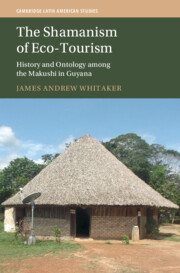3 results
3 - Missionaries, Explorers, and Other Spirits
-
- Book:
- The Shamanism of Eco-Tourism
- Published online:
- 30 January 2025
- Print publication:
- 06 February 2025, pp 61-81
-
- Chapter
- Export citation

The Shamanism of Eco-Tourism
- History and Ontology among the Makushi in Guyana
-
- Published online:
- 30 January 2025
- Print publication:
- 06 February 2025
1 - Securing the Future: Family, Livelihoods, and Mobility
-
- Book:
- Relative Distance
- Published online:
- 22 June 2023
- Print publication:
- 06 July 2023, pp 30-54
-
- Chapter
- Export citation

